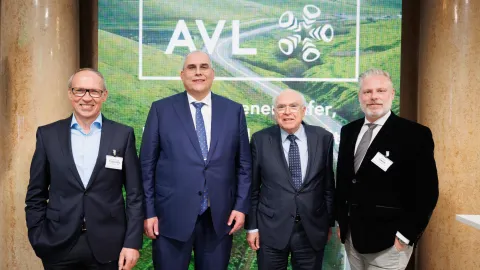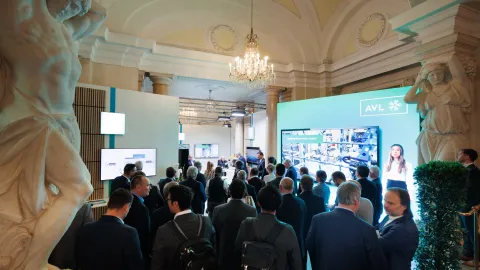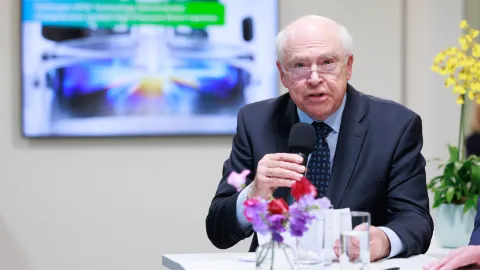AVL at the 44th Vienna Motor Symposium
- News
What kind of cars will we be driving in the future? These and other exciting questions around the topic of "Future Mobility" were addressed by more than 1,000 participants from 25 countries at the international 44th Vienna Motor Symposium. The tenor: Future automobiles will be CO2-neutral. The way to achieve this is via various energy sources and drive systems. These were also the focus of numerous journalists from Austria, Germany, the Netherlands and Israel. They sought out the conversation at the AVL stand.
Chairman and CEO Prof. Helmut List: "We have to use all important ways to achieve climate neutrality and also push research accordingly. Focusing on only one solution would mean depriving ourselves of opportunities for better and more efficient CO2 reduction." The key factor here, he said, is green primary energy: "Europe does not have ideal conditions for the provision of green energy. Therefore, we will have to import a substantial share of green energy, even in the long term. Diversification is essential here, not only in regional terms - keyword security of supply - but also in terms of the best energy sources for the various applications in each case, such as electricity or chemical energy sources like hydrogen or e-fuels." It's a matter of using the scarce, green energy as efficiently as possible. With the transport system becoming increasingly complex, this is only possible through an approach that is open to various technologies, he said.
Prof. Dr. Uwe Dieter Grebe, Executive Vice President AVL, Light Duty Vehicles & Racing: "The global vehicle fleet should make a contribution towards climate neutrality through CO2-neutral, renewable liquid fuels. At the same time, the technologies for electromobility must be further improved in order to offer affordable battery-powered vehicles that consume less energy and raw materials for everyone. There is still a great deal of potential in the further development of the components and the system of battery electric vehicles. This progress, just like the creation of the infrastructure, is crucial for market acceptance."
Dipl.-Ing. Gustav Tuschen, Executive Vice President AVL, Commercial Vehicles & Power Systems: "From today's perspective, there is no "one solution" in the commercial vehicle industry either. This is why AVL is investing in the development of hybrid, battery-electric, hydrogen as well as fuel cell drives and beyond that, in the further development of stationary plants for environmentally friendly hydrogen production."
Dipl.-Ing. Matthias Dank, Executive Vice President AVL, Instrumentation and Test Systems: "In addition to a resource-saving use of raw materials and energy, AVL relies on virtualization and a combination of measurement and simulation. In this way, we help to save resources and costs, as development times can be optimized and the number of real prototypes can be reduced. In addition, we give existing engine test beds a second life. They can be converted to measure brake dust emissions or test alternative drives and fuels by making minimal adjustments."
Images: © AVL | Joseph Krpelan



